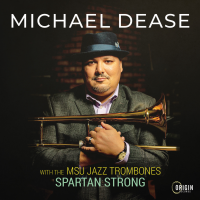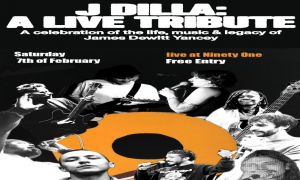
Nels Cline was been straddling the line between jazz and rock guitar since the late '70s. He got his start working with jazz musicians of the likes of Julius Hemphill, Charlie Haden and Tim Berne, while also doing more rock-oriented stuff with Mike Watt, the Geraldine Fibbers and others, though his major claim to fame these days is his gig as lead guitarist for Wilco. While that band is seemingly on a never-ending tour, Cline has found time to work with his main band, the Nels Cline Singers, as well as a side project with Yuka Honda called Fig, with other stuff coming down the pipe, as well. We caught up with Cline on the day his excellent new album, Initiate, came out on Cryptogramophone.
What's going on?
I'm home for one day, so I'm trying to do all this stuff!
Yikes! Well, congrats on the new record coming out today.
Yeah I'm pretty excited about it. I'm not sure what a release date means anymore, but I'm always excited to have something released.
The artwork is really striking, which is usually the case on your records. Are you someone who is into the visuals, or do you just happen to work with labels that are?
I'm into the artwork, absolutely. I actually did the artwork for the Singers record 'The Giant Pin.' With this one it was the producer David Breskin that brought Simon Norfolk's photos of a Large Hadron Collider to my attention. He has an interest and knowledge of art and design well beyond my own, so I just turned David and [label head] Jeff Gauthier loose on it. I told them which image I wanted on the outside, and David and I agreed without any discussion that there would be no typography on the cover. I'm older and I like to hold the object in my hand -- I know the CD is becoming an archaic form, but I just want it to look bitchin', you know? [Laughs]
 Why do a double CD with one live disc and one studio one?
Why do a double CD with one live disc and one studio one?
Even though it's not packaged this way, I think of the live record as more of a bonus disc. The studio record is by design a different thing -- my earlier stuff was a kind of same in a way, either with my old trio or with the Singers, but with this [studio album] I wanted to make something that stylistically embraces more grooves, more of a world-music influence, more drone. I wanted to use my voice and not do so much free jazz. I guess I wanted something with more sunlight in it. Something that could get in the body and not always be in the head. The live album is more of what we do as the Singers. There are new pieces; there are cover songs that we do live sometimes; there is a song called 'The Inkling' that the Singers play. The live disc is what we do mostly, which is basically screw off. [Laughs]
With Wilco so active, do you get much time to do your own stuff these days?
I don't get to do a lot of live work, but I do a lot of recorded stuff. There's plenty of stuff coming out, but I just can't do quite as much on the road of that music because of the activities of Wilco. I'm enjoying Wilco, but they will always be a band that tours a lot. I'm not complaining though, because every time Wilco has a break I do all the other stuff, which is why I'm only home for one day! I've been thinking about cloning myself, but as an identical twin [to drummer Alex Cline] I'm not sure if it's such a good idea.
As someone who improvises a lot in his own bands, how much composing goes into the Singers' material?
It varies a lot. There are certain pieces in the past that are almost programmatic. These may have an overarching idea and be infused with drama and very structured. I call these my fascistic pieces.
Can you give me an example?
On the new record there is less overt fascism, but in the past there have been pieces like 'The Ballad of Devin Hoff' or 'Mixed Message,' which is long and episodic. On the new record there is 'Mercy (Procession),' which first appears on the record as a duet with me and Devin [Hoff] that then goes into this long, repetitive march. There's not a lot of writing, but it has to build in intensity, so there isn't a lot of room to go off. Then there is stuff like 'Blues, Too,' which is on 'The Giant Pin' as well as 'Initiate”s live CD. It's just a line that we play and then we go off. The only direction is that we not play a blues. We allude to the blues in E flat for the first five seconds and then go wherever we want to go.
What was the appeal of the cover songs you picked for the live CD?
I've been playing pieces by Carla Bley for years because I'm obsessed with Paul Bley and compositions of hers performed by Paul Bley or anybody, for that matter. We just threw in 'And Now the Queen' at the last minute because we wanted something that was free but quiet. 'Boogie Woogie Waltz' kind of started something. When [song composer] Joseph Zawinul died. it sort of threw me in a way that I didn't expect. I wasn't the hugest Weather Report fan, but I love that early stuff. It just represents a certain joy to me that very little other music does. Pieces like 'Jungle Book' are infused with a non-saccharine feeling of joy, and that sort of carried over to the studio CD with that sunny feeling where I didn't have to be angst-ridden all the time.
For more information contact All About Jazz @ Spinner.




























